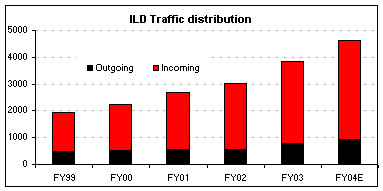Data Access (India) Limited will hit the markets with an initial public offering on March 29. The company is mainly engaged in the buisness of offering international long distance voice traffic services in India. Let us see what the offering is like and the pros and cons of the issue.
| Issue Summary |
|
| ||||||||||||||||||||||||||||
| Issue structure |
|
| QIBs | Non-Institutional Investor | Retail Portion | |
| No. of shares | 25,000,000 | 12,500,000 | 12,500,000 |
| % of total size | 50% | 25% | 25% |
| Minimum Bid/Application size | Rs 50,001 | Rs 50,001 | 100 shares |
| Maximum Bid/Application size | Not exceeding the size of the offer | Not exceeding the size of the offer | Rs 50,000 |
| Background |
|
|
Data Access India Limited is mainly engaged in offering international long distance (ILD) voice traffic services in India. Based on the Survey of the Indian Telecom Industry, Data Access is the second largest International Long Distance (ILD) voice traffic service provider in India, with a turnover of Rs 6.3 bn in the financial year ending September 2003. The company started operations in June 2000 as a category 'A' Internet Service Provider (ISP). It received the license to operate ILD services in March 2002 and has garnered over 25% market share in the incoming voice traffic coming to India. Since outgoing traffic from India has only been deregulated in February 2004, Data Access has very low exposure to this segment. While 97% of the traffic is incoming, the rest is from the outgoing voice traffic segment. | |
| Business | |
|
Data Access is primarily engaged in providing telecom services in two areas. The company provides ILD voice traffic services. It also provides services as an ISP. As an ILD operator, it acts as a conduit to transmit voice traffic that originates across the globe and which is to be terminated in India and vice versa. While this takes care of the incoming voice traffic, the outbound traffic segment, which till now was regulated by the TRAI, has been opened up to competition recently. The company has already applied for providing this service. As of now most of the revenue contribution is from the incoming voice traffic. The company also has an ISP license and has an Internet subscriber base of over 44,000. Apart from providing ILD voice traffic and ISP services, the company also provides Gateway Internet services, Switch IPLC services and IPLC origination and termination services. The company also provides complete end-to-end telecom solutions for call center operations in the country by way of its Switch IPLC services and IPLC origination and termination services. Apart from India, the company also has obtained operator licenses in US, UK and Sri Lanka through subsidiaries and joint ventures. With these licenses, the company is in a position to offer ILD services in these countries. Data Access along with its subsidiaries has interconnect agreements with 110 international ILD companies, which enable it to operate on a global scale. Thus, the company has taken steps to de-risk its business model by not fully concentrating on the Indian geography. | |
| Promoters | |
|
Data Access is promoted by Pacific Netinvest and SPA Enterprises. While Pacific Netinvest holds 49.7% stake in Data Access India, SPA Enterprises holds 24.3% stake in the same. Both Pacific Netinvest and SPA Enterprises are promoted by Mr. Siddhartha Ray, who holds 56.9% and 74.9% stake respectively in both these companies. Mr. Siddhartha Ray is an engineering (electronics and telecommunications) graduate and is also a post graduate diploma holder from IIM Calcutta. With a career spanning over 28 years, Mr. Siddhartha Ray has occupied top management positions in companies like Bennett Coleman and Company, Star TV and RPG Enterprises. | |
| Objects of the Issue | |
|
The company plans to raise capital for:
| |
| Sector | |
|
Since the company is primarily involved in the ILD segment, we would restrict the sector analysis to the same. ILD traffic in the country is skewed in favour of the incoming traffic. The ratio of total incoming to outgoing traffic is approximately 4:1. The graph below indicates the nature of total traffic seen in India. India is one of the fastest growing telecom markets in the world today and due to the significantly rising telecom penetration in the country, the Department of Telecommunications (DOT) has predicted that the growth in outgoing traffic is likely to outpace the growth in the incoming traffic in the future.
As far as geographies are concerned, the India-America corridor accounts for 51% of the Indian ILD traffic. The next largest corridor is that of the India-Middle east/ Europe, which accounts for 23% of the traffic, while the rest of the world accounts for 26% of the traffic. As far as the industry structure is concerned, there are four key players in the market, which include, VSNL, Data Access, Reliance Infocom and Bharti Telesonic. Both VSNL and Data Access account for over 60% market share in the incoming voice traffic. The outbound voice traffic has been recently (February 2004) opened up to competition by the government. Over the last few years, the settlement rates (the charge to be paid to the international carrier for incoming traffic) have been falling drastically. This is mainly due to the emergence of competition in this sector. Players like Data Access and Bharti Telesonic have drastically cut rates in order to capture market share. This has happened due to the excess capacity of bandwidth across the globe. Players like Data Access have been able to lease bandwidth at very low rates, thus have been able to provide services at a very competitive rate. | |
| Reasons to apply |
|
|
Well-entrenched operations: Data Access began operations immediately after the ILD sector was opened up and it has managed to establish itself as a major player in a matter of just two years. This speaks well about the management's foresight and execution skills. The company has managed to create an entry barrier in terms of pricing by offering to provide services at a very low rate. Thus, by doing so, the company has garnered a large market share in a short period of time (over 25% in a matter of just two years), making it rather difficult for any potential new entrant to operate in a consolidated market and at such low rates. | |
|
Possible upside from outgoing traffic segment: Outgoing traffic has been opened up recently and Data Access has bid aggressively for the same. The company has also emerged as the lowest bidder for carrying traffic from Bharat Sanchar Nigam Ltd's (BSNL's) subscribers to the US, UK, Canada and West Asia. These sectors account for nearly 63% of the outbound traffic from India and if the company wins the bid then there will be a significant positive impact on both the topline as well as bottomline of the company. | |
|
Derisked operations: With a view to derisk its operations, which have been solely focused on India, the company has set up subsidiaries in the US and UK to tap the ILD traffic in these large markets. Data Access has also ventured in to the Sri Lankan market by way of a joint venture and this venture is expected to act as a pilot market, before the company enters the soon to be liberalized Pakistani and Bangladeshi telecom sectors. | |
|
Tapping new segments: The company is gaining ground in the 300 bn minute per year call center market, which is much larger than the ILD segment (just 6 bn minutes per year). The company already has 22 clients and is adding between 4 to 5 clients per month. Data Access offers call centers a switch from dedicated private networks to a usage-based regime, where there are better chances for the call centers to reduce their telecom costs. These initiatives are likely to enable the company make strong inroads in this large segment. |
| Reasons not to apply |
|
|
Concentrated focus: While the company is totally focused on the ILD segment and has diversified across regions, this strategy may not hold promise in the long-term. Globally, telecom service providers are diversifying their risk by venturing into new areas to provide a bouquet of services in order to derisk their businesses. For example, Data Access's competitors like Bharti and Reliance, have unified licenses to provide telecom services in the country and ILD is just another business segment for them. Also, the largest ILD service provider in the world, Teleglobe, with which Data Access is benchmarking itself, offers a wide array of services including ISP services and international mobile connectivity services. | |
|
Impending and current competition: Telecommunication services are basically a commodity i.e. the lowest service provider grows faster. Though Data Access has a large market share in the incoming traffic segment, competition is likely to catch up. BSNL's entry into the ILD segment may change the whole complexion of the industry. Since nearly 90% of the fixed line subscribers belong to either BSNL or MTNL, almost whole of the incoming and outgoing ILD traffic may be diverted to BSNL. BSNL, due to its large domestic telecom network subscriber base, may be in a better position to negotiate rates with international last mile carriers for its ILD foray. Also the other two players, namely Reliance and Bharti have deeper pockets than Data Access. The implication is that if BSNL enters into the ILD segment, all the other ILD operators would have to rely on other service providers for traffic. Since This means that Data Access may lose significant traffic if BSNL enters in to the fray. | |
|
Lack of data trasmission services: The company has chosen to concentrate on the voice segment and in the process, has provided no clarity on the fast growing data transmission segment. While the company has been able to cater to the call center market, the BPO segment, which has a high requirement mainly for data transmission, may be left out. This is a high growth segment in which most of the telecom service providers like VSNL and BSNL are focused on. | |
|
ISP business falling behind: The latest Telecom Regulatory Authority of India (TRAI) figures indicate that Data Access has actually shown a fall in its subscriber base, indicating that competition is capturing market share. In the strategy report of the company seen in the IPO prospectus, the company fails to mention its vision for this business. This means that the ISP business may not be a focus area going forward. | |
| Financial Performance |
|
| (Rs m) | FY02 | 18mFY03 | FY04 | ||
| Sales | 27 | 921 | 6,014 | ||
| Other Income | 6 | 9 | 204 | ||
| Total Income | 33 | 930 | 6,217 | ||
| Expenditure | 448 | 1,782 | 5,672 | ||
| EBIDTA | (421) | (860) | 342 | ||
| GPM (%) | -1581.5% | -93.4% | 5.7% | ||
| Depreciation | 66 | 175 | 184 | ||
| Interest | 35 | 80 | 22 | ||
| Profit before tax | (515) | (1107) | 339 | ||
| Tax | - | - | 118 | ||
| Net Profit | (515) | (1107) | 222 | ||
| NPM (%) | -1935.8% | -120.1% | 3.7% | ||
| No. of shares | 199.4 | 199.4 | 199.4 | ||
| EPS (Rs) | -2.6 | -5.5 | 1.5 | ||
| P/E Ratio (x) | 12.5 | ||||
| Shareholding |
|
| % | Pre-Offer | Post-Offer |
| Promoter Group | 74.1 | 55.5 |
| Others* | 25.9 | 19.4 |
| Public | - | 25.1 |
| Total | 100.0 | 100.0 |
| Valuations and comments |
|
|
Assuming an offer price of Rs 18.5 (average of Rs 17 and Rs 20), the stock trades at 12.5x FY04 (September ending) earnings on a standalone basis. On a consolidated basis, the company has reported losses for FY04. While the company has managed to garner a large market share of the incoming ILD voice traffic, competition is not far behind and BSNL's entry (if it decides to) will be a major determinant of the entire nature of the industry going forward. This significantly increases the risk profile of the company. Though on a valuation basis the stock looks relatively inexpensive, the concerns regarding its concentrated focus and commodity nature of the business makes it a risky proposition. Also, while the company has taken steps to hedge against geographical risks, it is up against strong competition, which has deep pockets. This adds uncertainty to the success of the operations of its subsidiaries abroad. Equitymaster.com is one of India's premier finance portals. The web site offers a user-friendly portfolio tracker, a weekly buy/sell recommendation service and research reports on India's top companies. |








 © 2025
© 2025